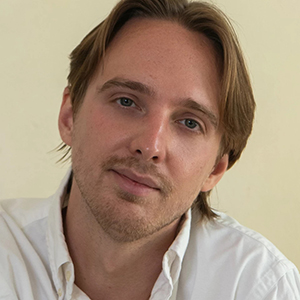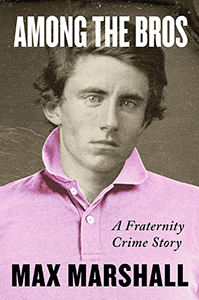Interview with Max Marshall


Max Marshall
author of "Among the Bros: A Fraternity Crime Story"

Michael Carter
Co-Host
Max Marshall, author of "Among the Bros: A Fraternity Crime Story"
Max Marshall's Website
Max Marshall is a writer and journalist. Raised in Texas, he attended Columbia University, where he graduated summa cum laude and Phi Beta Kappa in 2016. He served as a Princeton in Asia Media Fellow in Hanoi, Vietnam, and his work has appeared in GQ, Texas Monthly, Sports Illustrated, and the New York Times. He lives in Austin.
Max Marshall’s “Among the Bros” investigates a multimillion-dollar crime network among fraternity brothers at the College of Charleston.
“It’s almost a sign of prestige,” an anonymous college student tells the journalist Max Marshall in “Among the Bros”: “While everyone is refining their lives to get ready for the professional world,” he and his fraternity brothers “can go hard.” No matter what harm they cause in the process, he knows he is so well connected that “I am still going to be taken care of.”
Stunning in both its self-awareness and audacity, this admission succinctly captures the environment in which Marshall’s gripping crime story takes place. Across American higher education, the Greek system openly lauds its traditions — something the author knows well from his years as a Delta Sigma at Columbia, where he graduated in 2016. But “Among the Bros” reveals an unofficial mantra that appears to lie at the core of elite Greek life: We will behave badly, and we will get away with it.
Set at South Carolina’s bucolic College of Charleston beginning in 2013, the book tells the story of Mikey Schmidt, a scrappy, 5-foot-7 freshman from Atlanta who wears Augusta National shirts and drives a Mercedes as he vies for a spot among the taller, wealthier members of the prominent Sigma Alpha Epsilon fraternity. Marshall can’t tell if he gets a bid from S.A.E. (“he told people that he got one, but the S.A.E.s I talked to said they didn’t remember meeting Mikey as a freshman”), but we do know Schmidt ends up joining Kappa Alpha — a “midtier” frat with origins linked to the Ku Klux Klan — despite coming off to many of the brothers as a “try-hard” during recruitment.
Mikey quickly forms the brotherly bond he hoped for, with the K.A. president Rob Liljeberg, who shares Mikey’s interests in weed and video games. After seeing “Rob sell marijuana at a booming rate” from his dorm room, Mikey abandons his fake-ID enterprise to devote himself fully to drug dealing. By 2016, the operation has grown into a multitiered ring that supplies not just the College of Charleston, but campuses across the South, with millions of dollars’ worth of cocaine, narcotics, Xanax and other drugs.
After spending 15 months researching sorority culture at the University of Alabama, I came to feel that what the young women of Tuscaloosa were seeking in the Greek system was a sense of belonging. But in this page-turning triumph, the pack mentality ventures into darker, more dangerous waters, exposing a rigged system of money and power that is alive and well in the American South.
Marshall cites the influence of the 1978 movie “Animal House” on elite white fraternity culture, which thereafter went from cardigan-wearing campus leaders to fun-loving rule breakers who nonetheless remained above the law. With the cinematic precision of a true-crime documentary (“Murdaugh Murders” comes to mind), “Among the Bros” explains how the consequences of this paradigm shift turned deadly.
Told with journalistic integrity, a sense of humor and gruesome detail, Mikey Schmidt’s rise from try-hard to big-time drug lord is as breathtaking to witness as the ring’s takedown, in a 2016 bust that uncovers tens of millions of dollars’ worth of illegal drugs. The implosion of the brotherhood is swift; as one K.A. reminds us, “You can’t spell frat without rat.”
The injustice of the ensuing judiciary process is devastating, but unsurprising. Schmidt is sentenced to 10 years without parole, but most of the ring’s dealers get probation at most, and are still able to graduate. (C of C even allowed Kappa Alpha to return to campus in 2020.) The slippery slope of impunity begins with a frat-friendly local defense attorney getting the brothers’ D.U.I.s erased from their records; it ends with student drug traffickers evading jail sentences, even after one of their own is murdered.
“If the fallout from the drug bust has taught them something,” Marshall writes, “it’s that as long as you’re one of the boys, you can usually go as hard as you want without having to learn anything.” As much as their classmates and victims might hate them, they know: “They’ll all be working for us some day.”